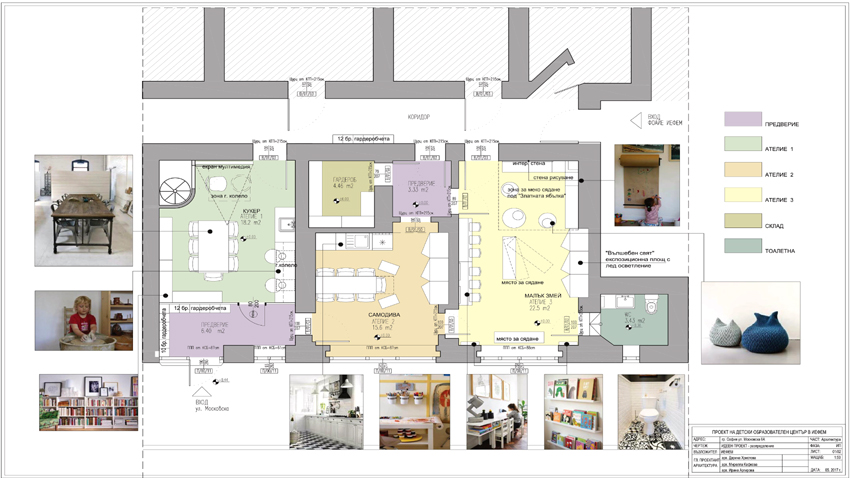Learning through interactive games, out-of-school lessons, handicraft courses led by professional craftsmen – these are some of the planned activities in the future educational center at the National Ethnology Museum in Sofia.
In 2016 the museum organized a campaign entitled “Know Your Traditions to Love Your People” and thanks to it part of the needed financing for opening the center was collected. Some 17,000 euros more are needed.
Among the first who helped the realization of the idea are a group of young architect from the Meshtra Association who prepared the project for free. Work on the new center will start immediately after a green light is given from the National Institute for Immovable Cultural Heritage and money is collected. The center in the royal palace on Alexander Battenberg square in the capital city of Sofia will be housed in several halls. Each one of them will have a name – “Malak Zmey” (Little Zmey), “Kuker” and “Samodiva.”

Architect Irina Argirova from the project team told us more:
“Malak Zmey will be the hall for the youngest children with specially adapted furniture and a stage where children would perform Bulgarian folk tales. We have the support of stage artist Maria Koicheva and her students. In the Samodiva Hall there will be a special place for preparing ritual bread and traditional meals as all the necessary equipment will be present. All rooms will be connected, too. The third hall is called Kuker and it will be used by young people, students and adults. Children’s and adult’s trainings could take place. We have planned to install a traditional pottery wheel. Presentations and lectures will be held and the tables in the room can be used for playing board games too. One could enter this room from the royal garden and when the weather is nice a number of outdoor activities will take place.”
Irina Argirova is part of the Meshtra Association that aims at preserving the natural and cultural heritage of Bulgaria.
Despite the fact the association was created not long ago – in 2015, the young architects have already realized a few projects in Bulgaria’s Etar, the village of Dolen and in Strandzha Mountain. The name ‘Meshtra’ has not been chosen by chance. It means master craftsman and shows a link to the old Bulgarian craftsmen who have built characteristic Bulgarian stone houses.
In the new center, entrepreneurs in tourism and other spheres would be able to consult experts. More from expert at the Institute of Ethnology and Folklore Studies at the Bulgarian Academy of Sciences Petar Kardzhilov:
“When people interested in starting a small or medium business come here, experts would help them discover the opportunities. This would be a center for analysis of the risk and it would provide hints for success and would help businesses be environmentally friendly and in harmony with the traditions of the local community.”
Let’s hope that the new center would help in preserving Bulgarian traditions, so they do not fall into oblivion.
English: Alexander Markov
Photos: iefem.bas.bgBulgarian violinist Iva Hölzl-Nikolova premiered "Hungarian Melodies" by Wilhelm Ernst for Bulgaria. The concert on February 19 was her third appearance as a soloist of the Gabrovo Chamber Orchestra and an occasion for the instrumentalist with a..
Professor Georgi Djulgerov is the only Bulgarian filmmaker who joins the names of world cinema, winners of the FIPRESCI Platinium A ward. In 2025, the International Federation of Film Critics (FIPRESCI) marks its 100th anniversary. On this..
The talented young artist Nedislav Peev, diagnosed with 90% autism, has his own gallery in Dobrich. Thanks to the tireless efforts of his mother, Kamelia Todorova, the young man is now registered as an artist with the registration agency - a precedent..
On March 8, Seojun Kim from South Korea, the winner of the first prize in the men's category at the 2024 International Ballet Competition..
Bulgarian women artists in Chicago are preparing their fifth annual exhibition entitled "Ladies Turn". The opening is scheduled for 23 March at 832 Lee St,..
The play “Systemic Error 2052” will be presented in Sofia on March 7 as the premiere will take place at I am Studio theatre. The play which aims..

+359 2 9336 661
